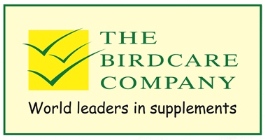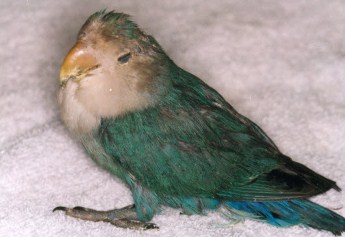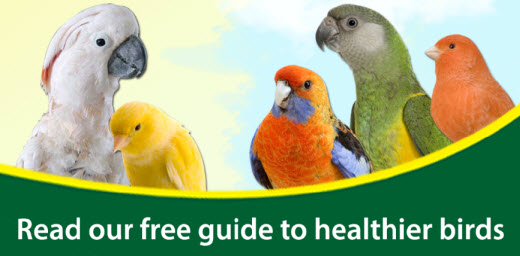
This page attempts to help bird keepers with the most common bird diseases and symptoms they see when their birds get ill...
This article is based on the problems reported to us through our advisory services and covers the most likely causes of these symptoms and reasonable first aid procedures that the bird keeper can carry out. Space limitations mean it is by no means fully comprehensive and it does not and cannot replace the diagnostic facilities available from your avian vet.
Because most illness in birds is caused by poor diet, Calcivet (CalciBoost in Export areas) plus Daily Essentials3 or Feast (Flourish in Export Areas) or EasyBird Rest, Moult & Show are likely to help most conditions. These products will help your bird get better but please don’t stop using them when the bird recovers. They should be a part of your bird’s diet FOR LIFE. Customers who use these products routinely have far fewer sick birds. Sometimes, for treatment, sick birds need support from one or more specialised ‘sick bird’ products.
Quick links: Appearance symptoms Symptoms in the droppings Breathing problems Behavioural symptoms Physical symptoms
Quick links:
- Sick bird look
- Poor feathering
- Greasy feathers
- Scaly face/scaly legs
- Deformed beaks
- Lice and mites
- Swollen feet
Most sick birds tend to look hunched and they fluff their feathers and often sleep with their head turned over their shoulder. This symptom can be caused by hundreds of different illnesses so it isn’t much help for diagnosis but it is often the first sign that you will spot. Separate the sick birds if possible. Put them into a warm environment. The quicker you can give such birds Guardian Angel the better. This product will provide energy (fluffing feathers is an effort to maintain body warmth), help maintain the bird’s water balance, provide support for the digestive system and give the immune system a boost. In our opinion this approach is far more likely to work than giving broad spectrum antibiotics. If the bird has completely stopped eating you may need to force feed with Poly-Aid (Survive in Export Areas). Intestinal worms may also cause a general sick bird look. Worm neophemas, and any other birds with access to aviary floors, regularly with Harkaverm.
Poor feathering and/or slow moults
This is generally caused by insufficient dietary methionine (an essential amino acid) and calcium though other deficiencies may also be involved. Calcivet (CalciBoost in Export Areas) plus Daily Essentials3 or Feast (Flourish in Export Areas) or Feather-Up or Easy-Bird Rest, Moult & Show will sort this out.
Greasy feathers
This is often a symptom of liver disease. Reduce the workload on the liver by getting Feast (Flourish in Export Areas) and/or Daily Essentials3 or EasyBird Rest, Moult & Show into the diet. Blood tests are recommended to confirm the diagnosis and help identify the cause of the problem (obesity, fungal infection etc). See watery droppings later.
Scaly face or scaly legs
This is caused by a mite infestation. Better nutrition will make it far easier for birds to fight off the early infestation before it becomes established and requires treatment with Ivermectin (unfortunately we are currently unable to source this product).
Deformed beaks
Beaks that are poorly formed often fail to wear down properly. Deficiencies (methionine, sulphur, biotin and calcium) are the most common cause but liver damage can show a similar effect. Either way the treatment is the same - Calcivet (CalciBoost in Export Areas) plus Daily Essentials3 or Feast (Flourish in Export Areas) or Feather-Up or EasyBird Rest, Moult & Show. If the liver is damaged the level of success will depend on how much functioning liver is left. Other likely symptoms include poor feather condition, slow moults and watery droppings. Regardless of the cause it will take 9-12 months for new (better) beak material to reach the ‘wearing zone’ and during that time beak trimming by your bird vet may be required.
Lice and mites in cages
The presence of external parasites in the cages or on the birds can cause serious losses - especially to babies. Dust nest sites and birds with Blast-Off Anti Mite.
Swollen feet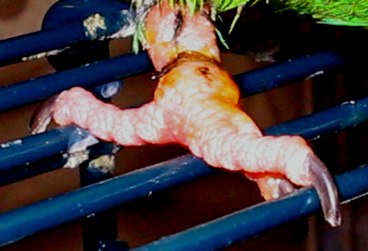
Red and swollen feet are often caused by all the perches in the cage being the same size. This prevents the feet from being properly exercised and can cause pressure points that are prone to infection. Natural perches are the best prevention. Contact us for details. Treatment involves good hygiene (disinfect cages and perches with Avisafe (Enviroclens in Export Areas)) and immune support with Calcivet (CalciBoost in Export Areas) plus Daily Essentials3 or Feast (Flourish in Export Areas) or EasyBird Rest, Moult & Show and a short term dose of Guardian Angel. If the feet have white lumps under the skin then the chances are this is gout. This is an indication of kidney failure and the bird struggling to cope with the breakdown products of protein metabolism. The kidney does not repair itself well but we can reduce the amount of stress on the kidneys with the usual supplements of Calcivet (CalciBoost in Export Areas) plus Daily Essentials3 or Feast (Flourish in Export Areas) or EasyBird Rest, Moult & Show.
Quick links:
Watery droppings (excessive urine as opposed to diarrhoea) This is a common symptom of liver or kidney disease or possibly diabetes. Obesity or infection could have caused the condition though by the time you see the symptom the bird may be very under-weight. Reduce the workload on the liver by using Feast (Flourish in Export Areas) and/or Daily Essentials3 or EasyBird Rest, Moult & Show. Because the bird is urinating excessively it will be losing water soluble nutrients. Guardian Angel and Calcivet (CalciBoost in Export Areas) in the water are advised to help replenish these.
Diarrhoea
It is very important that this is differentiated from watery droppings. Diarrhoea is large amounts of water in the dark (faecal) part of the droppings. The most common cause is a digestive tract infection with bacteria such as E. coli or Salmonella. The herbs in Feast (Flourish in Export Areas) will help combat this as will the replenishment of beneficial bacteria through Potent Brew. Antibiotics are not our preferred treatment for diarrhoea as they destroy the good bacteria as well as the bad which risks upsetting the gut even further.
Passing whole seeds
This may be a symptom of a host of digestive disorders which could include the rather devastating Proventricular Dilatation Syndrome (PDS or PDD). You may need to feed appropriate drug therapies from your vet. More likely giving Potent Brew and/or worming your bird may solve less devastating digestive malfunction.
Quick links:
Tail bobbing, wheezing, nasal discharge
Respiratory infections are very common and can be difficult to get rid of. If taking the above route, diagnosis and drug sensitivity tests are important. Giving a broad spectrum antibiotic to a bird with a fungal infection may make it worse and there are no treatments for viral infections. Delivery of medicines to the respiratory tract can be tricky. For these reasons we prefer boosting the immune system. Feast (Flourish in Export Areas), Guardian Angel and Calcivet (CalciBoost in Export Areas) are the starting point. We believe that calcium deficiency and respiratory infections go hand-in-hand. We often then suggest extra herbal support from Flourish and/or Wheeze-Eeze [which can be added to food and water as well as sprayed (or better still nebulised) for the bird to inhale]. Other approaches that may be helpful are Colloidal Silver in the water or nebulising with our disinfectant Avisafe (Enviroclens in Export Areas).
Quick links:
Fear and aggression - biting - excessive noise
These are common behavioural symptoms of calcium deficiency. Give Calcivet (CalciBoost in Export Areas) five days a week for 1-2 months then drop to twice a week.
Feather plucking and other selfmutilations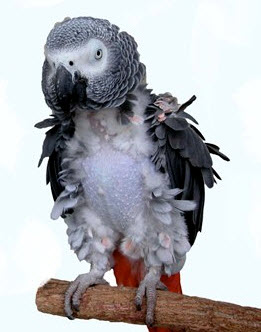
Whilst giardia and zinc toxicity are possible causes by far the most common problem is calcium deficiency. Calcivet (CalciBoost in Export Areas) plus Daily Essentials3 or Feast (Flourish in Export Areas) or EasyBird Rest, Moult & Show is very successful, though Potent Brew short term (2- 6 months) seems to relax the birds and improve the situation enormously.
Egg-binding in hens, small clutch sizes, splayed legs, rickets in very young birds and poor co-ordination, twirling and star gazing in recently fledged babies are all calcium problems relating to breeding Give Calcivet (CalciBoost in Export Areas) twice a week prior to breeding and five days a week to all breeding and baby birds from the commencement of egg-laying to 1-2 months after reaching full adult size.
Fits and seizures
These are all potential physical symptoms of calcium deficiency in adult birds. Give Calcivet (CalciBoost in Export Areas) five days a week for 1-2 months then drop to twice a week. Falling off perches, poor co-ordination, poor flying, twirling, star-gazing, clenched fists These are all potential physical symptoms of calcium deficiency in adult birds. Give Calcivet (CalciBoost in Export Areas) plus Daily Essentials3 or Feast (Flourish in Export Areas) or EasyBird Rest, Moult & Show.
Frequent infections and general illness
This is a sign of general malnutrition with particular emphasis on vitamin A which is involved in the effective formation of membranes within and surrounding all cells. Poorly formed cell walls are prone to infection. Vitamin C, vitamin E and selenium deficiencies may also be involved. Feast (Flourish in Export Areas) or Daily Essentials3 or EasyBird Rest, Moult & Show is the standard prevention as they all provide a very broad spectrum of vitamins and trace minerals plus herbal immune and digestive system support. Guardian Angel is the normal first aid treatment.
